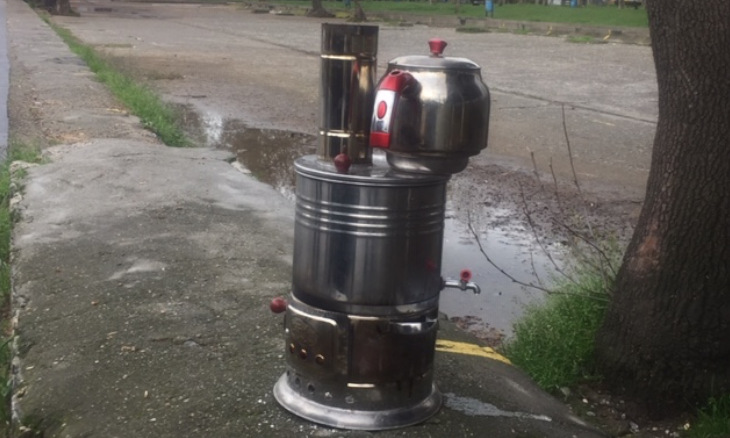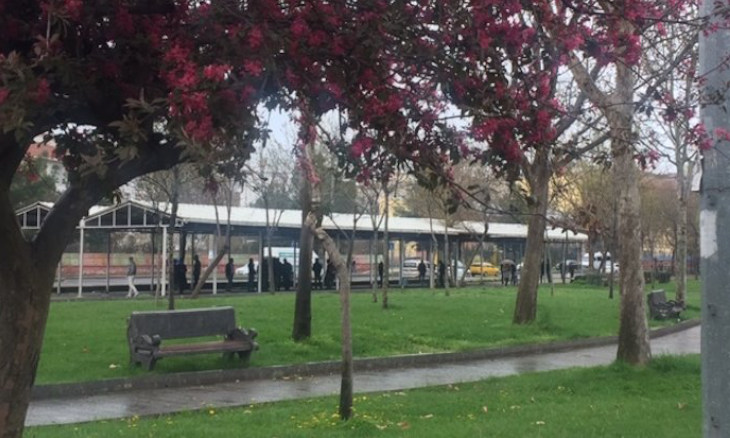Despite police pressure, unemployed men sell tea on Diyarbakır's streets
Vecdi Erbay writes from Diyarbakır: Since cafes and teahouses have been closed due to the coronavirus, a number of people started selling tea on the streets of Diyarbakır. Some of them are roving tea sellers. They stroll around the city until they come across a policeman.
Vecdi Erbay / DİYARBAKIR
In the building across the street, there are two elderly men in two apartments. Now and then I can see them looking out the window. The coffeehouses and parks are closed and, now that those 65 and older have been banned from leaving their homes, they cannot go outside. Like many people in the neighborhood, they can meet in front of their door and chat but they cannot leave. There are people who speak in groups from their windows, looking out at the children playing football and those passing by on the street. They cannot leave, so they live by the window.
A man with a cart collecting salvageable materials comes down the street. The call he shouts over and over to get people's attention echoes inside the house. While the sun does occasionally comes out, it has been raining for days on end in Diyarbakır. On one hand I don't mind the rain, on the other hand during rainy weather, the number of people going out declines severely. This is a good thing because when it is sunny out, the streets and markets get crowded. The one-meter distance that people keep between each other that was recommended by experts is not being adhered to whatsoever.
The sun that reveals itself between the clouds invites people to go outdoors. In that case, I figure it wouldn't be a problem to go out for a walk in the park. I pass by those who are hanging out in groups quickly.
“Is there anyone drinking tea?” I asked, which turned out to be an unnecessary question as I saw three or four people drinking it. The intention of the question was so I could introduce myself to the man selling tea in the park.
“There sure are, brother, why shouldn't they?” the tea seller answered, as if the coronavirus had not reached Diyarbakır at all and he hadn't heard the warnings that experts have been making for days.
He had set up a stand near one of the fountains in the park. By stand, I mean a medium-sized samovar alongside paper cups. He attempted to fill me a cup but I declined, feeling like I was denying myself the enjoyment of having tea in the park.

It has been a while now since cafes and teahouses have been closed due to the coronavirus, and in Diyarbakır, a number of people selling tea on the streets have emerged. Some of them are roving tea sellers. In one hand, they have a thermos and in the other, a tray with saucers, and they can be found in particular around the Şeyh Said Square and other crowded areas. Others, like the one I've met, have set up in parks or on the street with samovars.
I had assumed that those selling tea on the street had previously worked at cafes and teahouses before they were closed down, and it didn't come to my mind that a doorman would start doing this sort of job. However, I was wrong of course. This dark and weak man was restless and had lots to talk about.
“No brother, I was a doorman. The contractor fired me six months ago, from a building I worked at for two years. Then he said 'two doormen is one too many, I'm letting you go.' I took him to court. After I was fired I learned that I was working for six months without insurance. Let's see what the court says,” he said.
The contractor in question is a well-known person in the area. The tea seller is afraid that the court will take his side. “The guy has lots of money, many lawyers.” He gave his name and the name of the building where he previously worked and said “If you want you can take my photograph, writing the truth is enough.” He said that just as he doesn't trust every contractor, he doesn't trust every journalist.
While the sun from time to time shows its face, the weather is cloudy. It appears as if it will rain. I didn't want to get wet but the conversation with the tea seller deepened, and eventually at his insistence, I had a cup of tea. “We don't have any sort of coronavirus, brother,” he said, trying to make me feel comfortable.
'Am I supposed to become a thief instead?'
How did he get the idea to sell tea? After getting fired, he worked on a construction site for a while, but when the construction was completed he once again found himself unemployed. When he couldn't find another job, he purchased a samovar for 40 TL and set up shop in the park. The money he earns changes from day to day. He says it's good when the sun is out, but if it's rainy he stays at home. “You can't get rich selling tea at the park, I only earn a little and it's not enough anyway,” he said.
The police do not give permission for people to sell tea in the park. When the police intervene, he takes his samovar and leaves. “What am I supposed to do? If I don't come home with 10 TL my kids are going to be hungry. They say 'don't sell tea in the park.' Okay then, I won't sell tea, then give me a job. I go to the employment agency but nothing ever comes. I'm forced to sell tea. What am I supposed to do, become a thief? I have four children, and they all depend on me,” he said.
Announcement from armored vehicle: Stay at home
An armored vehicle that comes down the street announces in Turkish and in Kurdish “Stay at home for your health.”
“I'm neither retired, nor a civil servant, nor am I rich. How am I supposed to stay at home, go ahead and tell me,” the man says, looking at the vehicle making the announcement.
The rain starts to fall. It is illegal to sit on the benches in the park. Armored police vehicles that pass through warn those who are sitting on them. The former doorman who became a tea seller packs up his counter. The tea, paper cups and sugar cubes are all placed in separate bags. These are easy to carry but what about the samovar? The man is used to it, however, and picks it up and runs toward a canopy near the street. The people wandering in the park have now assembled under this canopy. Rather than escaping the rain and going home, they must think the rain is just going to come and go because it is April.

In spite of paying the price of getting soaked, I return home. The entire way back, I fixate on how the man asked whether he should become a thief. Of course, this wasn't the first time that I have thought about people that earn their livings from the street. But the desperation and authenticity in the tea seller's voice when he asked that question must have gotten to me.
But seriously, for people that have no other choice but to sell things on the street, what are they supposed to do if a curfew is imposed tomorrow? It will be almost impossible for them to survive financially.
